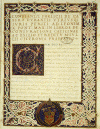Humanism
Seeking the Wisdom of the Ancients
The great intellectual movement of Renaissance Italy was humanism.
The humanists believed that the Greek and Latin classics contained
both all the lessons one needed to lead a moral and effective life and
the best models for a powerful Latin style. They developed a new,
rigorous kind of classical scholarship, with which they corrected and
tried to understand the works of the Greeks and Romans, which seemed
so vital to them. Both the republican elites of Florence and Venice
and the ruling families of Milan, Ferrara, and Urbino hired humanists
to teach their children classical morality and to write elegant,
classical letters, histories, and propaganda.
In the course of the fifteenth century, the humanists also convinced
most of the popes that the papacy needed their skills. Sophisticated
classical scholars were hired to write official correspondence and
propaganda; to create an image of the popes as powerful, enlightened,
modern rulers of the Church; and to apply their scholarly tools to the
church's needs, including writing a more classical form of the Mass.
The relation between popes and scholars was never simple, for the
humanists evolved their own views on theology. Some argued that pagan
philosophers like Plato basically agreed with Christian revelation.
Others criticized important Church doctrines or institutions that
lacked biblical or historical support. Some even seemed in danger of
becoming pagans. The real confrontation came in the later sixteenth
century, as the church faced the radical challenge of Protestantism.
Some Roman scholars used the methods of humanist scholarship to defend
the Church against Protestant attacks, but others collaborated in the
imposition of censorship. Classical scholarship, in the end, could
not reform the Church which it both supported and challenged.
-
Costanzo Felici,
History of the Catilinarian Conspiracy

In Latin,
Dedication copy for Leo X,
Early sixteenth century,
In the High Renaissance, Rome was the center of the literary
movement known as "Ciceronianism" that aimed to standardize Latin
diction by modelling all prose on the writings of Cicero. The
leaders of the movement hoped thereby to make Latin usage more
precise and elegant; they also hoped to establish a kind of
linguistic orthodoxy maintained by the authority of Rome. Pietro
Bembo and Jacopo Sadoleto, Pope Leo X's two Latin secretaries,
were the leaders of the movement. Bembo, famously, took an oath
no use no word that did not appear in Cicero. Although Cicero
had been admired and imitated by Renaissance humanists from the
time of Petrarch on, now admiration was elevated almost into
worship. One example of this maniacal Ciceronianism is this
"History," written by an ambitious young cleric for presentation
to Leo X. In it, Costanzo Felici confected a politically-correct
revision of Sallust's "Catilinarian Conspiracy," in which
Cicero's role in suppressing Catiline, largely dismissed by
Sallust himself, was magnified to superhuman proportions.
Vat. lat. 3745 fol. 1 recto
human01 JH.09
-
Pius II (Aeneas Silvius Piccolomini),
Commentaries

In Latin,
Autograph,
Fifteenth century
Although humanists had thronged the papal court since the
beginning of the century, Pius II was the first real humanist to
sit in the chair of Peter. Born in Siena as Enea Silvio
Piccolomini, he acquired a reputation as a diplomat, belletrist,
and womanizer, and was crowned poet laureate by the Emperor
Frederick in 1442. After serving the emperor and the anti-Roman
Council of Basel, Piccolomini joined the Roman camp in 1446. He
became a cardinal in 1456 and in 1458 was elected pope. As pope,
the only work of scholarship he was able to continue was his
"Commentaries," a remarkably frank autobiography in which he put
his passions and prejudices on full view. In the passage shown
here, Pius expresses his bitter contempt for the French, who had
been unwilling to join his crusade against the Great Turk.
Reg. lat. 1995 fol. 35 recto
human02 JH.17
From here there are exits to rooms with:
You can also walk back to the Main Hall.

